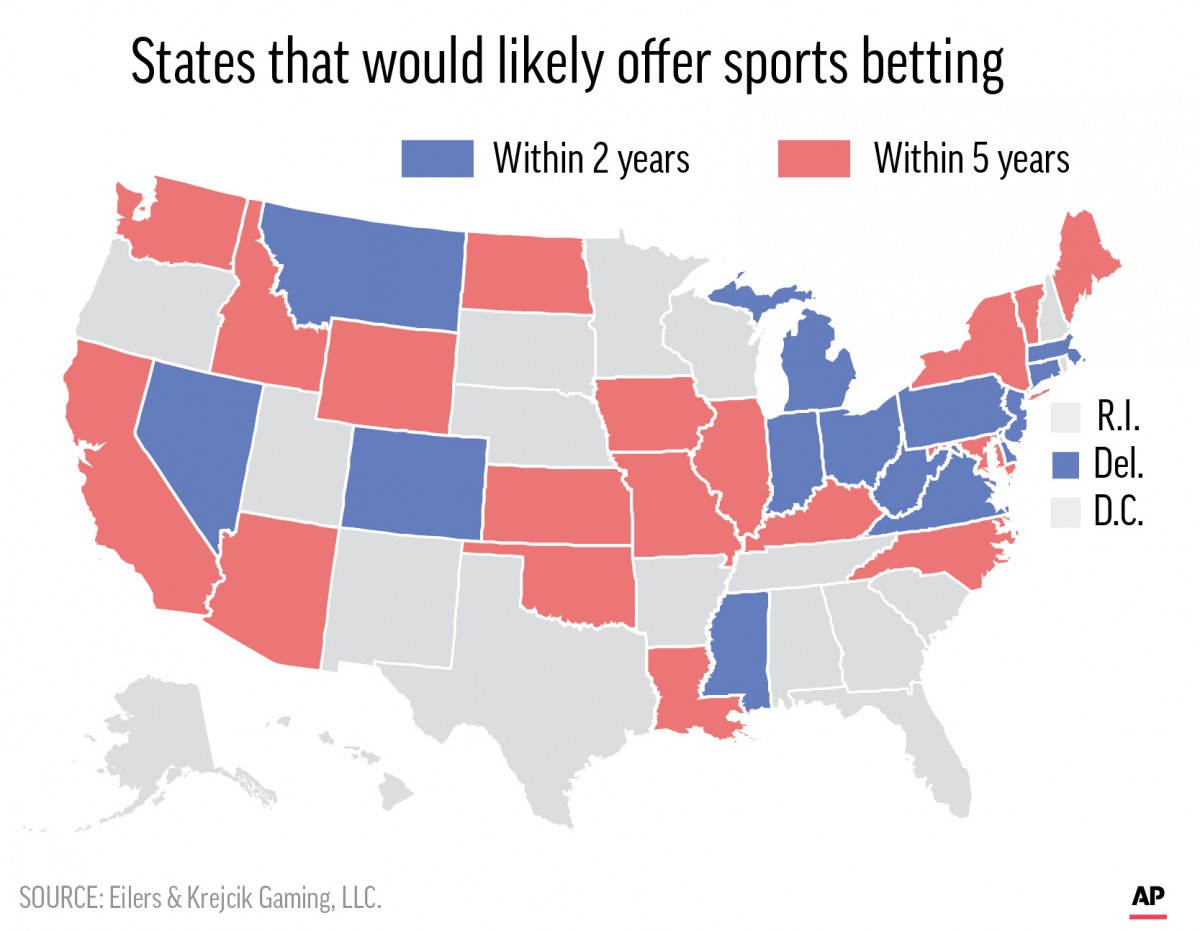By Jeff Jenkins, WV Metronews
CHARLESTON — West Virginia’s gamble to get ahead of the competition paid off when the U.S. Supreme Court ruled Monday morning that states are now free to legalize sports gambling.
State lawmakers voted this past regular session to legalize sports betting in West Virginia at the state’s five casinos and through smartphone apps run by the casinos. Gov. Jim Justice allowed the bill to become law without his signature.
Today the governor expressed excitement after hearing about the Supreme Court’s ruling.
“I think it’s great because, to be perfectly honest, today we all know there’s a lot of illegal sports betting going on all over our country,” Justice said to reporters Monday at the Capitol.
“For us now to be able to capture dollars that are significant and meaningful to our state, as well as other states, that’s what I think we ought to do. So I think it’s good news.”
Across the United States, the underground sports betting economy is estimated to be worth at least $150 billion a year.
West Virginia was the only state legislature this year to pass such a law. Pennsylvania and Connecticut had previously passed legislation.
“Other states have looked at us as the leader in this and we’re nationally recognized as leading this,” Senate Finance Committee Chairman Craig Blair, R-Berkeley, said during a Monday appearance on MetroNews “Talkline. “This is model legislation.”
Blair added there’s no need for a special session to work out arrangements with the professional sports leagues. He said any remaining issues or deals can be worked out between the casinos and the leagues.
Delegate Shawn Fluharty, D-Ohio, has been one of the main advocates for sports betting in West Virginia. Fluharty said he was doing cartwheels, although he remained concerned about the possibility that the Justice administration may continue to back fees from casinos to professional sports leagues.
“When I first introduced this legislation two years ago it was in anticipation of this day happening. Finally, West Virginia is at the forefront of something and not simply following others like we have in the past,” Fluharty said.
The Supreme Court was ruling on a New Jersey challenge to a 1992 law — the Professional and Amateur Sports Protection Act — outlawing sports betting in states other than those that were grandfathered in, specifically Nevada.
Supreme Court Justice Samuel Alito wrote the majority opinion released Monday morning. He said the federal ban passed in 1992 was a direct affront to state sovereignty.
“The legalization of sports gambling requires an important policy choice, but the choice is not ours to make,” Alito wrote.
“Congress can regulate sports gambling directly, but if it elects not to do so, each state is free to act on its own.”
West Virginia officials have estimated a 90-day window for casinos to get up and running. But, in addition to the new law, rules and minimum internal control standards would need to be in place for the casinos to start operating.
“We’ve tried to prepare ourselves as best we can to go forward,” West Virginia Lottery Director Alan Larrick said Monday on MetroNews “Talkline.”
Eric Schippers, a senior vice president with Penn National Gaming, which owns Charles Town Races & Slots, praised West Virginia.
“Hats off to West Virginia for being so forward looking, to get out ahead of the game,” Schippers said. “They were the first in the nation to really do it right, to follow the Nevada model that had been on the books for 20-plus years and be able to position itself to strike while the iron is hot.”
Professional sports leagues have said the nationwide ban is necessary to preserve their integrity.
In anticipation of the anticipated Supreme Court ruling, the sports leagues have been advocating for an integrity fee — often citing a 1-percent slice of all wagers. Casinos only make profit after the winnings are paid out from the overall wagers.
That debate has been spiraling in West Virginia. The Legislature has shown no interest in what the leagues are calling an “integrity fee,” but Gov. Justice has been more receptive.
Last week, the Justice administration pulled together representatives of West Virginia’s casinos plus Major League Baseball, the National Basketball Association, the National Hockey League and the Professional Golf Association to discuss the fees.
Justice earlier had wanted to call the Legislature into special session to reconsider the fees.
“I think there’s a real benefit, always, to partnering with people rather than fighting,” Justice said to reporters Monday. “And the amount of the integrity fee is going to be borne by the casinos. And they can afford that. Our state is really having to pay nothing.”
National writers who cover the gaming industry have pointed out that any money paid to leagues by casinos is money that might otherwise come to the state.
Justice’s family owns The Greenbrier resort, which has a casino. The resort also hosts The Greenbrier Classic PGA event and plays host to practices by NFL and NBA teams.
The casinos were upset late last week by the governor’s apparent willingness to accept the integrity fees.
“How can the governor turn his back on an industry that provides $350 million a year and employs 4,000 people in the state of West Virginia and side with the New York billionaires. It’s just to give them money. It’s incredible,” John Cavacini, president of the West Virginia Gaming and Racing Association, said late last week.
Speaking to reporters Monday, Justice wasn’t clear on whether he still thinks a special legislative session is necessary.
“I don’t know,” he said. “I think there needs to be some additional discussion and everything, and I don’t know if there’s a way to do it without legislation. But I’m an open book, guys. All I’m trying to do is help West Virginia.”




